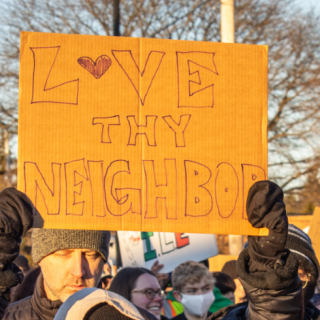Advertisement
After Columbus police maced City Council President Shannon Hardin while he was peacefully protesting, activists were certain he would finally flex his political power to make change.
But instead, some activists now say his actions since being maced are typical, and mirrors how many Columbus Black leaders have historically responded to the failures of the Columbus Division of Police.
Some Black leaders may talk tough, but what about meaningful action, like passing police reform legislation?
“No substantive policy changes have been made yet,” says progressive activist Joe Motil. “You have groups and representatives from various organizations trying to get the ear of city hall officials to implement real police reform measures, but we are still in the same old review, committee and recommendations mode. Resolutions like racism is a public health issue don’t provide the necessary measures to address the social, economic and racial disparities of this community.”
In a recent Dispatch article profiling Hardin, which Motil calls a “fluff-piece,” it was revealed Hardin, after being maced, had called former Mayor Mike Coleman for advice on what he should do next.
“What kind of leader calls the former Mayor (Coleman), who secured his appointment and political career, right after he gets peppered sprayed and asks him what he should do?” asks Motil. “Hardin still takes his marching orders from Coleman and corporate Columbus and developers.”
Older activists may recall how Coleman refused to cooperate with the Department of Justice when it investigated and filed a civil suit against Columbus police in the late 1990s for violating citizens’ constitutional rights. Coleman successfully had the DOJ’s suit dropped.
Activists also feel the local NAACP has not been vocal enough of late, and wasn’t vocal enough after past police shootings, such as Tyre King and Henry Green.
What’s more, when Columbus NAACP president Nana Watson was recently asked by a reporter if she approved of how Chief Thomas Quinlan was doing his job, she responded, to the effect, “It wasn’t the NAACP’s place to speak to that.”
Activists tuning in were riled. One activist says it showed a lack of conviction, indecision and a failure to connect with those families who have suffered at the hands of Columbus police.
“The Columbus branch of the NAACP has failed people of color. They turned a blind eye, so their hands have blood on them as if they pulled the trigger,” says De-escalate Ohio’s founder and President Cynthia Brown. “They could have of demanded transformation years ago but were silent. Now everyone is speaking out about police accountability and transparency.”
Brown’s inspiration comes from her 30-year-old nephew Kareem Ali Nadir Jones, who in 2017 was shot in the back and killed by Columbus police. (The police body cam video of Kareem’s death can be viewed here.)
It is well known, say activists, that President Watson was a supporter of Chief Quinlan prior to Mayor Ginther’s announcement of his choice for police chief and not candidate Perry Tarrant, an African American who was favored by Black Columbus.
Columbus NAACP spokesperson John Coats says even though President Watson didn’t offer an opinion on Chief Quinlan, that doesn’t mean they haven’t put “a lot of pressure” on our police and Mayor Ginther to make change.
“Some people are critical of our president (Watson) whether she wears blue shoes opposed to black shoes. Criticism comes with any position she takes,” said Coats.
He said the Columbus NAACP is working with City Council on nine demands, which include increased mandatory racial bias and de-escalation training.
Coats says activists forget how the Columbus NAACP demanded Columbus police wear body cameras and won. Or how they demanded the Vice unit be reformed and won.
“We went through that process with the city until the body cameras were in place, and all issues in association with the body cameras. The Vice unit was torn down completely, and we worked with them in making sure a new structure was put in place,” he said. “That’s real work done by our volunteers attending real meeting and conferences and strategy sessions to make that happen.”
Activists also charge the local NAACP is too friendly, too beholden to Mayor Ginther.
“As it relates to working with somebody or being friendly with them, we’ve had this type of relationship with this administration that we should have with any administration, and that is to be an advocate and they have been welcoming. They may not agree with us, but they have engaged in that process. And that has not always been the case in Columbus,” says Coats. “If that’s called being friendly with the mayor’s office, that’s interesting.”
City Council press secretary David Miller says they hear citizen’s concerns City Council isn’t moving fast enough or decisively, but they are indeed taking action.
He stated in an email City Council has “codified the BCI investigations of certain use-of-force situations. This was passed during the July 6th Council meeting.”
“Council has also held a series of public hearings, with the intent of obtaining as much public feedback as possible,” he wrote. “Council is working on legislation currently and we expect votes on related measures based on public feedback by the end of July.”
He said City Council’s July legislative package will pursue changes to non-knock and quick-knock raids, the expansion of police background checks, vote to destroy or end the use of militarized weapons used by Columbus police, and seek to create “a Civilian Review Board and a city-funded, operationally-independent, professionally-staffed, public entity empowered to participate fully in criminal or administrative investigations involving CDP personnel.”
Brown of De-escalate Ohio is meeting with Hardin this Thursday (July 16th), but she has reservations about Hardin’s true intentions for reform.
“Hardin voted to give the police one million dollars. The vote was 4 to 3,” says Brown, referring to how City Council approved $1.05 million on July 6th to upgrade police cruisers with new equipment.
Brown says Hardin has the chance to act decisively – by passing legislation that could have a serious impact on police brutality. Like ending qualified immunity for police.
Brown is helping to draft state legislation with Ohio state representative Erica Crawley (D-Columbus) to hopefully end qualified immunity, the immeasurably flawed legal protection doctrine which has allowed law enforcement to put to death whomever their racist-tinged beliefs warrant because it forgives the ultimate of low standards (murder), thus protecting their jobs and shielding them from civil lawsuits.
Brown says Hardin should take Crawley’s lead and try to pass a city ordinance that would end qualified immunity.
“Absolutely the only way to change Columbus police is through policy,” says Brown.



